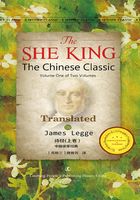
CHUNG FUNG
1 The wind blows and is fierce
He looks at me and smiles,
With scornful words and dissolute,—the smile of pride.
To the centre of my heart I am grieved.

The 'Complete Digest' expands the line very well:—今我中道見棄, 何父母養我不終也.
L1.5,6. Both 胡 and 寧 have the sense of 何, 'how'. So, Choo. Maou explains 胡 in the same way by 何; but he says nothing of 寧. Wang Yin-che takes 寧here in the sense of 乃 or 曾, denoting 'a turn in the discourse'; but the meaning comes to the same thing, the 5th and 6th lines being construed closely together. The mind of the marquis was all perverted; could it but get settled as it ought to be, he would treat the speaker differently. To quote again from the 'Complete Digest':—心志囘惑, 亦胡能有定哉, 使其有定, 則古道之善, 宜知之也, 何為獨不我顧也. 報=荅, 'to respond to'. The speaker did her duty as a wife. She longedfor the marquis to respond to her with the duty of a husband. The last line in st. 3 is difficult to construe. It is still interrogative like those of the preceding stanzas:—'would it be given to me to be forgotten?' As Choo expands it:—何獨使我為可忘者耶. So also the last line in st. 4 may be regarded as interrogative, though we are able to translate it as it stands. 述=循,'to be in accordance with', i.e., with the principles of reason. So, both Maou and Choo. According to Choo's interpretation of this ode and the next, which I believe to be correct, they ought to take precedence of the last.
The rhymes are—in st. 1, 土, 處, 顧, cat.5, t.2: in 2,冒*, 好*, 報*, cat.3, t.2: in 3, 方, 良, 忘, cat.10: in 4, 出,卒, 述, cat.15, t.3.
Ode 5. Metaphorical. CHWANG KEANG BEMOANS THE SUPERCILIOUS TREATMENT WHICH SHE RECEIVED FROM HER HUSBAND. The old interpreters think the lady is bemoaning the cruel treatment which she received from Chow-yu. The imperial editors approve of Choo's view, but have in their edition preserved also the earlier. If Choo's interpretation be correct, the ode should, like the last,be placed before the 3d; 'he did not venture', say the editors, 'to alter the existing order of the pieces';—because to do so would have brought him into collision with the authority of Confucius.

2 The wind blows, with clouds of dust.
Kindly he seems to be willing to come to me;
[But] he neither goes nor comes.
Long, long, do I think of him.
3 The wind blew, and the sky was cloudy;
Before a day elapses, it is cloudy again.
I awake, and cannot sleep;
I think of him, and gasp.
4 All cloudy is the darkness,
And the thunder keeps muttering.
I awake and cannot sleep;
I think of him, and my breast is full of pain.


Maou treats the piece as allusive; it seems better to understand with Choo that the stanzas all begin with a metaphorical description of the harassing conduct of duke Chwang.
St. 1. 2. L1.1. Maou and Choo both explain 終風 by 終日風, 'wind through all the day'. Wang Yin-che, as has already been observed, takes 終 here, and generally in the She, as=既; which is ingenious, and probably correct. 暴=疾, 'rapid', 'fierce'. The Urh-ya says, 風而雨土為霾, 'wind after which the dust descends like rain is 霾'.
St. 3,4. L1.1,2 曀 denotes 'dark and windy';—the wind blowing, and clouds at the same time obscuring the sun. In 不日有曀, the 有=又, 'further, 'again'. I translate the 1st line of st. 3 in the past tense. We are then led to think of the sky clearing for a time; but before a day elapses (不日), it is again overcast. The reduplication of 曀 in st. 4 denotes 'the app. of the darkness or cloudiness', and 虺虺 signifies, acc. to Choo, the muttering of thunder before it bursts into a crash, while Maou makes it the crash itself.
Stt.1,2 L1.2—4. The 2d line describes some titful gleams of kindness shown by duke Chwang; and the 3d line, how they were only deceitful and mocking.謔=戲言, 'sportive, or scornful words'. 浪=放蕩,'dissolute', 'unlicensed'. The Urh-ya explains 謔浪笑敖all together by 戲謔. 莫往莫來 express the uncertainty and changeableness of duke Chwang's moods. He would neither go nor come; was neither one thing nor another. Maou's explanation of the line is very farfetched.—'Chow-yu did not come as a son to serve Chwang Këang, and she could not go and show to him the affection of a mother.' 悼=傷, 'to be wounded', i.e.,with grief. 悠悠,—see on i. I.
St. 2,3,4, L1.3,4. 言 must be treated simply as a particle. Here it is in the middle of the line as in ode I., stt. 4, 5. Taking 言 as a particle, we cannot explain願 by 'to wish'. Maou says nothing about it, but Choo defines it by思, 'to think'.

